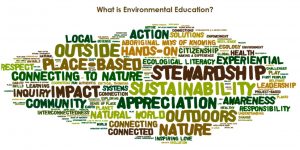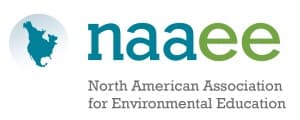
What is Environmental Education (EE)?
We believe that environmental education (EE) is a long-term investment in the general health and well-being of individuals, communities, ecosystems and the planet.
Effective environmental education produces ecologically literate citizens who understand and value healthy environments. They understand their connection to and impact on natural environments, and through this understanding become motivated to act as environmental stewards and live sustainable, healthy lives.
Columbia Basin Teachers: This graphic represents what teachers in the Columbia Basin have told us that Environmental Education means to them.
BC Ministry of Education: Environmental education aims to integrate concepts and principles of the sciences and social sciences, such as ecology, biogeography, sociology, environmental chemistry, environmental psychology, politics, and economics (to name only a few) under a single interdisciplinary framework. It can help students learn about how they are connected to the natural environment through traditional subjects and through direct experience in both natural and human designed systems like their school buildings. In the ecological view, students may come to know and understand that all human environments, societies and cultures are deeply embedded and dependent on natural systems, both for their development and their continued survival.
North American Association for Environmental Education (NAAEE): Environmental Education is learner-centered, providing students with opportunities to construct their own understandings through hands-on, minds-on investigations. It involves engaging learners in direct experiences and challenges them to use higher-order thinking skills. It is supportive of the development of an active learning community where learners share ideas and expertise, and prompt continued inquiry. It provides real-world contexts and issues from which concepts and skills can be used.
United Nations Educational, Scientific and Cultural Organization (UNESCO): The goal of environmental education is to develop a world population that is aware of, and concerned about, the environment and its associated problems, and which has the knowledge, skills, attitudes, motivations, and commitment to work individually and collectively toward solutions of current problems and the prevention of new ones.
Top 10 benefits of environmental education to students as cited by the National Environmental Education Foundation
- Access to Nature and Outdoor Play Offer a Host of Health Benefits
- EE Helps Build Critical Thinking and Relationship Skills
- EE Instructional Strategies Help Foster Leadership Qualities
- EE Makes Other School Subjects Rich and Relevant
- EE Teaches Students to be Real-World Problem-Solvers
- EE Helps Students Become Self-Directed Learners
- EE Gets Apathetic Students Excited About Learning
- EE Schools Demonstrate Better Academic Performance across the Curriculum
- EE Is a Perfect Match for Community Service Learning Requirements
- EE Offers All Students Equal Chances for Academic Success





